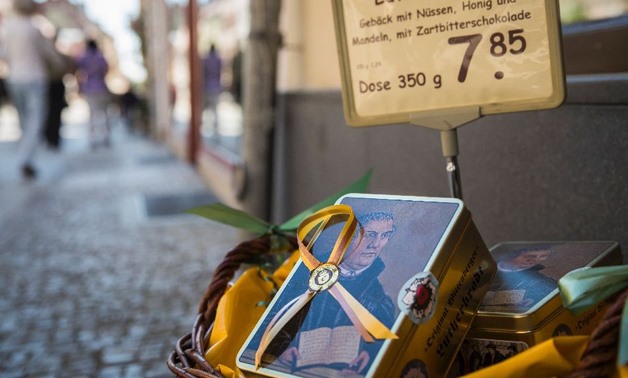
The German town of Wittenberg is cashing in on its 16th century resident Martin Luther, with many items bearing his image - AFP Photo/Odd ANDERSEN
Wittenberg (Germany) (AFP) - Carrying an armful of "Luther Brodt" gingerbread to the cashier, Mikael Byrial Jensen admits sheepishly that Martin Luther would probably not have been impressed by the flood of souvenirs bearing his name.
Luther "said himself that saints are not special... but that's how it is today. We're Lutherans so it's a nice gift," said the Danish tour guide, of his purchase at a chocolatier in eastern Germany's Wittenberg -- also known as Luther town.
From burgers to rubber duckies to liquor, Wittenberg is cashing in on its 16th century resident, who changed Christendom forever.
It is on a door of a church here that Luther is said to have nailed his 95 theses in 1517, leading to a split with the Roman Catholic Church and giving birth to Protestantism.
As Germany commemorates the 500th anniversary of the Reformation, the seismic theological shift started by Luther, Wittenberg is decked out in full Luther regalia.
On arrival at the town's main train station, visitors are greeted with a giant rectangular block labelled "The Bible -- Luther's translation".
Walk a few metres and a billboard seeks to tempt the weary with a "Luther Burger".
In the display windows of shops running one kilometre (0.6 mile) through the centre of the old town, there is something for everyone -- a toddler-sized Luther teddy bear, bags of Luther pasta and Luther tea.
Asked what Luther had to do with sausages, Uwe Bechmann, who was doing a brisk business selling them with black bread topped with mustard, said with a broad grin: "Well, Martin Luther enjoyed eating them -- as you can see from his belly."
- Turning point -
Born in Eisleben on November 10, 1483, Luther moved to Wittenberg in 1511.
It was in the eastern town where he married Katharina von Bora, became a father of six children, and published his ideas attacking papal abuses and questioning the place of saints.
The theologian, who died in 1546, argued that Christians could not buy or earn their way into heaven but only entered by the grace of God, marking a turning point in Christian thinking.
But Luther also came to be linked to Germany's darkest history, as his later sermons and writings were marked by anti-Semitism -- something that the Nazis used to justify their horrific persecution of the Jews.
Yet the theologian's part in reshaping the religious order has unequivocally secured his place as one of the most important figures in European history.
For the 500th Reformation anniversary, Germany has declared an exceptional public holiday on October 31.
And tens of thousands of Christians from across the world are descending on the town of 47,000 inhabitants where history was made.
- 'They keep selling out' -
The head of Wittenberg tourist office Kristin Ruske said hotel bookings and demand for guided tours had doubled for January to March, even before the Reformation fest began.
Trains will leave every 10 minutes from Berlin to bring the faithful to the town in time for this coming weekend's Ascension church service.
And going by the number of tourists carrying jute bags featuring Luther's image, or the steady stream of people picking up Luther cookies, it is clear that the crowd just can't get enough of the theologian.
The boom in Luther souvenirs has been driven by this year's celebrations, Ruske noted.
"There are Luther noodles, Luther tomatoes, Luther chocolate and also Luther coffee. There are many great products that we sell... but there are also bizarre souvenirs. But as long as the demand is there, there'll always be offers," said Ruske.
The tourism office itself has been stocking 500 Playmobil figurines of Luther every month over the past year. "But they keep selling out," she said.
In fact, the 7.5 cm (3-inch) figure with a quill and a Bible "translated by Doctor Martin Luther" has become the German toymaker's bestseller of all time.
- Everything is marketed -
Toy store owner Kathrin Seliger, who has not sold any of the 395-euro ($444) giant teddy bears yet, acknowledged that the "Luther spirit is somewhat lost as everything is being marketed".
German retiree Renate Lukas, who was visiting on a day trip, said: "We are very happily celebrating the Reformation, but it should perhaps not be so kitschy."
Where should the line be drawn?
For Ruske, "it's up to the visitors to decide when it all becomes too much."
"If someone wants to eat Luther, wear Luther, smell Luther or drink Luther, is that too much? If that makes the visitor happy, then... please go ahead," she said.
At the commemorative door of the Schlosskirche (Castle Church) where Luther is believed to have nailed his theses, South Korean senior pastor Lee Won Jae was explaining the significance of the site to a group of 22 fellow churchgoers.
"We have visited to celebrate the 500 years of Reformation and we want to learn from the spirit of Luther," Lee said.
The group was on a tour of key sites in the Reformation movement, including Luther's birthplace Eisleben and Worms, where he was summoned to appear before authorities of the Holy Roman Empire on charges of heresy.
For the pastor, the souvenirs bearing Luther's image or writing serve a purpose.
"Every means that makes people think of Luther is important... because they would also think of the spirit of Reformation," said Lee.


Comments
Leave a Comment